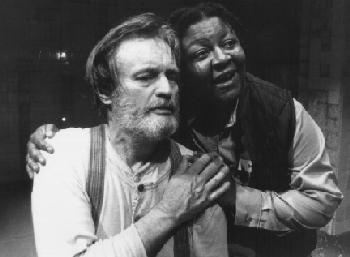SEARCH CurtainUp
On TKTS
LETTERS TO EDITOR
REVIEWS
FEATURES
ADDRESS BOOKS
Broadway
Off-Broadway
DC
NEWS (Etcetera)
BOOKS and CDs
OTHER PLACES
Berkshires
DC (Washington)
London
Los Angeles
QUOTES
FILM
LINKS
MISCELLANEOUS
Free Updates
Masthead
Type too small?
NYC Weather
Byrd's Boy
by Les Gutman
|
Forgive us our trespasses...
---Bruce J. Robinson's Richard E. Byrd, Jr. |

D. McCallum and M. L. Taylor (Photo: Marvin Einhorm)
|
Some of us read the newspaper to find out what's going on in the world. Others, like Bruce J. Robinson, troll it for inspiration. In 1988, an article appeared in the New York Times noting that the son of polar explorer Admiral Byrd, age 68, had been found dead in a warehouse in Baltimore. Some days earlier, the custodian (race unspecified) said he had ordered Byrd (presumably seeming very much like a homeless person) out of the warehouse. The coroner's report indicated he died of malnutrition and dehydration, brought on by Alzheimer's Disease. The time span of the story was less than three weeks, from September 13, 1988, when he left Boston on a train enroute to Washington, until October 3, 1988, when he his body -- dead for several days -- was found.
From this slim source, Robinson has fashioned Byrd's Boy. In his telling, Byrd (David McCallum) was found by a black female night guard, Birdie (Myra Lucretia Taylor), in a warehouse where he had essentially set up housekeeping. Babbling incoherently much of the time, and only intermittently possessing even a marginal awareness of who he was, Byrd nonetheless developed a friendship with Birdie, who harbored and fed him. This continued for at least several months (the story includes celebrations of both Halloween and Christmas), at which point he died. A parallel story -- related via a series of telephone calls -- involves Birdie's relationship with her own seven-year-old son.
In a style I would label "aspiring-to-lyricism," Robinson seeks to show the emerging bond between the two, and to have Byrd's cloudy search for his father inform Birdie's understanding of her own son's needs. (Much is also made of the similarity of their names, prompting several of the show's many flat-footed jokes.) In some of Byrd's more lucid moments, enough information about who his father was come out for Birdie to make the connection. (At one point, Robinson has Byrd recite what amounts to an encyclopedia entry on the great explorer.) Much of the play finds Byrd spouting gibberish about penguins or carrying on conversations with his father. Late in the play, he will conclude Birdie is his father, and she will play along.
That there is unavoidable denseness in much of what Byrd says is defensible, although it doesn't make for particularly useful or engaging theater. But why must Birdie tell lengthy stories that are every bit as incomprehensible and inaccessible? The net effect is a leaden two hours. Robinson sins more still when he tries to evoke Birdie's African American sensibilities; even in Myra Taylor's capable hands, they ring false. Perhaps the biggest crime is that the substantial talents of both actors are wasted on this material. Ditto for the production's design elements (especially Narelle Sissons's set), which can't be faulted in the least, and Arthur Masella's direction (with which I have little quarrel other than its inability to make sense of this mush).
Poetry doesn't have to rhyme, but it does have to flow.
|
Byrd's Boy
by Bruce J. Robinson Directed by Arthur Masella with David McCallum and Myra Lucretia Taylor Set Design: Narelle Sissons Costume Design: Judith Dolan Lighting Design: Peter West Sound Design: Donald DiNicola Running Time: 2 hours including 1 intermission Primary Stages, 354 West 45th Street (8/9 Avs.) Telephone (212) 333-4052 Opening June 11, 2001, closes July 1, 2001 Mon, Wed - Sat @8, Sat @2:30, Sun @3; $40 Reviewed by Les Gutman based on 6/8/01 performance |



